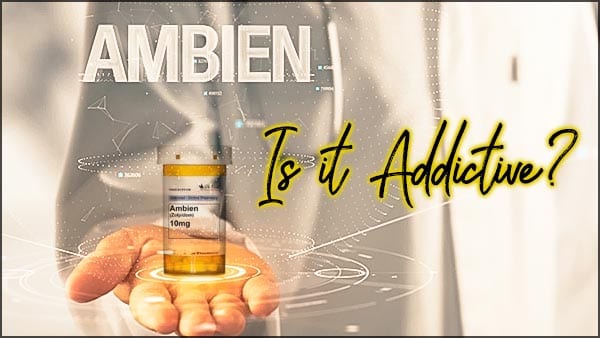Ambien is prescribed to around 20 million people in the US annually.
While it seems to be an effective sleep-aid for most people, there’s a darker side to the drug that many aren’t aware of.
Is Ambien Addictive?
Yes. Ambien has Addictive Potential. All sedatives carry the potential for dependence.
Ambien seems to have less addictive potential than some of the alternatives. Drugs like Xanax and Valium are sometimes used off-label to treat insomnia.
Ambien was originally only intended for short-term use. Unfortunately, as time has worn on more and more people have ended up using it long term and end up dependent on the drug to sleep at all.
This can progress to a full-blown addiction, where a person is obsessed with the drug and experiences physiological effects when they cease using it. Like most addictions, this usually results in an endless cycle of trying to avoid withdrawal by taking more of the drug.
It’s less prone to abuse than benzodiazepines but there have been many documented cases of full-blown addiction to zolpidem.
If you’re currently starting the cycle of dependence then getting help as soon as possible is a good idea. Talk to your doctor before modifying any medication regimen.
Read on and we’ll show you how one of the most popular pharmaceutical sedatives in the world has gotten some people hooked.
What is Ambien?
Ambien is the commercial name of a compound called Zolpidem Tartrate.
Zolpidem is classified as a Z-drug. These non-benzodiazepine sedatives are quite similar in action to drugs like Valium or Xanax but produce more sedation and have less of the effects desired for a high such as euphoria and anxiety relief.
In the past, Ambien has been one of the most widely prescribed drugs. It has a history of over 20 years of use in medicine but lately, it’s seen a fall-off in usage as some of the side effects have come to light.
Since zolpidem acts on the same receptors as benzodiazepines with slightly different results it’s easy to understand why people can become addicted to the drug’s recreational usage.
Dependence caused by regularly using the drug also occurs but in some individuals, it can cease without the need for medical intervention or drug abuse services. If you or someone you love is having trouble stopping, however, then a stay in a top-notch detox facility should be on your agenda.
What Are the Side Effects of Ambien Abuse?
Ambien has made the news on a regular basis since it was first introduced.
The amnesia and erratic behavior which can be produced by the drug has even led to the so-called “Ambien Defense”, blaming poor impulse control and memory loss for actions that a person wouldn’t normally take.
Amnesia and bizarre behavior are only the tip of the iceberg, however.
The usual symptoms of addiction apply to an Ambien addict, with the course of the addiction running similarly to benzodiazepines:
- Erratic behavior
- Mood swings
- Secretive behavior
- Sudden outbursts
- Slowed speech and movement
The long term effects of the drug can be particularly devastating for those who are abusing it. The effects are primarily cognitive, relating to memory and reasoning.
But, to top it all off for those who form a long term zolpidem habit is the fact that the drug is associated with an increased risk of cancer.
In the end, Ambien addiction is just as damaging as any other drug for those who get hooked.
Do You Withdraw From Ambien?
Physical withdrawal is a major concern for addicts and one of the biggest reasons that many people become locked into a struggle with their drug of choice.
Unfortunately, prolonged Ambien abuse can cause some nasty withdrawal symptoms and possibly tardive dyskinesia symptoms.. The symptoms are similar to those which are present in alcohol or benzodiazepine withdrawal although usually on a lower level.
For those who are “only” dependent, the following are signs of withdrawal symptoms:
- Rebound insomnia
- Anxiety
- Irritability
- Frequent mood swings
These will last about a week after stopping in most cases, although the time table can be longer or shorter by a few days depending on your personal chemistry.
For those with a prolonged case of addiction, the consequences can be much more severe. For those who’ve been abusing zolpidem in high doses for extended periods, the list looks much worse:
- Delirium
- Tremors
- Agitation
- Seizures
Those with a long history of use should receive medical attention during their detox process. Current protocols are similar to those used for alcohol or benzodiazepine withdrawal: a tapered dosage of a benzodiazepine is applied to ease withdrawal and keep the patient from danger.
If you’re worried about a forming dependence or addiction, speak to a doctor before you change your dosage or discontinue use to see what your options are.
What Can I Do If a Loved One is Abusing Ambien?
Ambien addiction can be frustrating for those around the addict.
Most addicts will insist they need it to sleep or to relieve anxiety. Approaching the subject of any addiction with a loved one can be hard, approaching someone because you believe they may be misusing a prescribed medication is even worse.
The best thing to do is speak with an addiction specialist who may be able to provide you with the information you need to speak to the person and get them started on the road to recovery.





